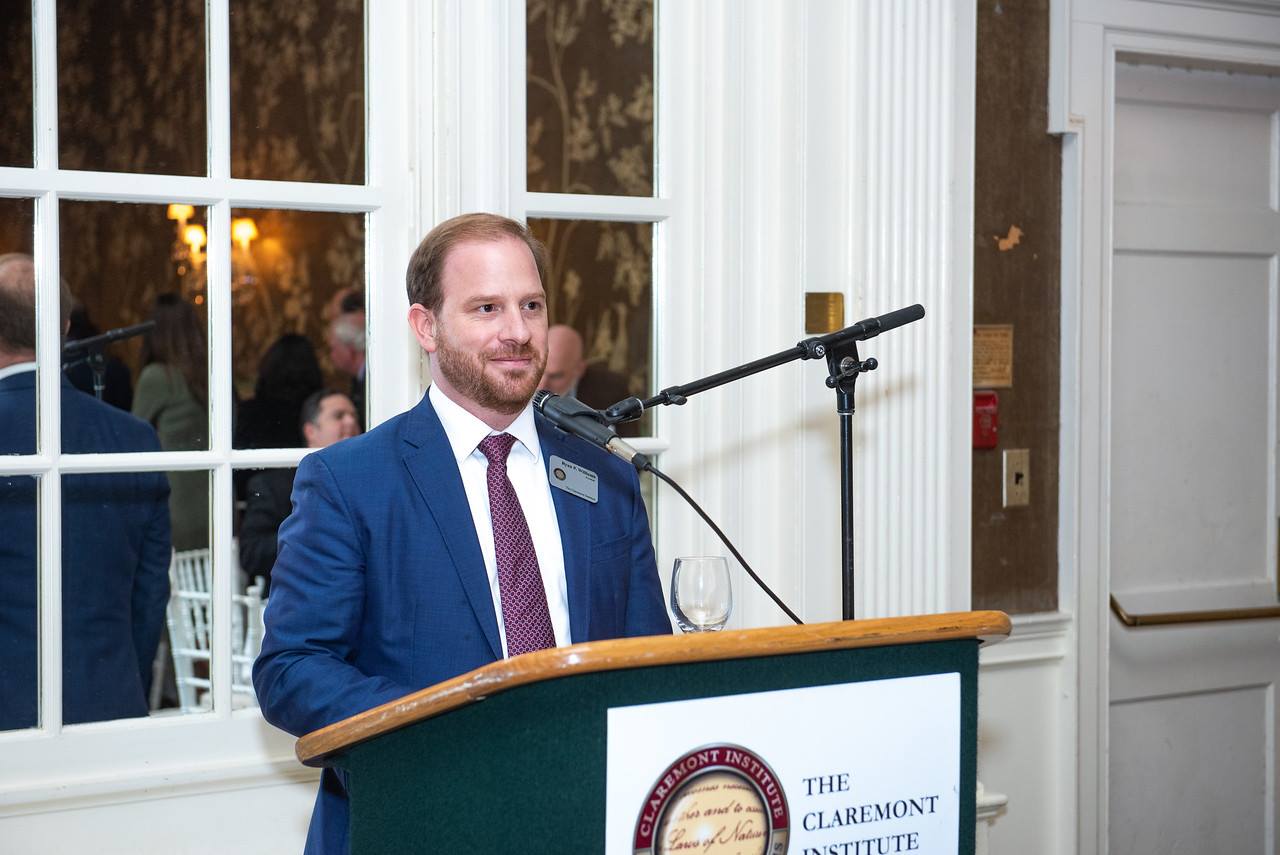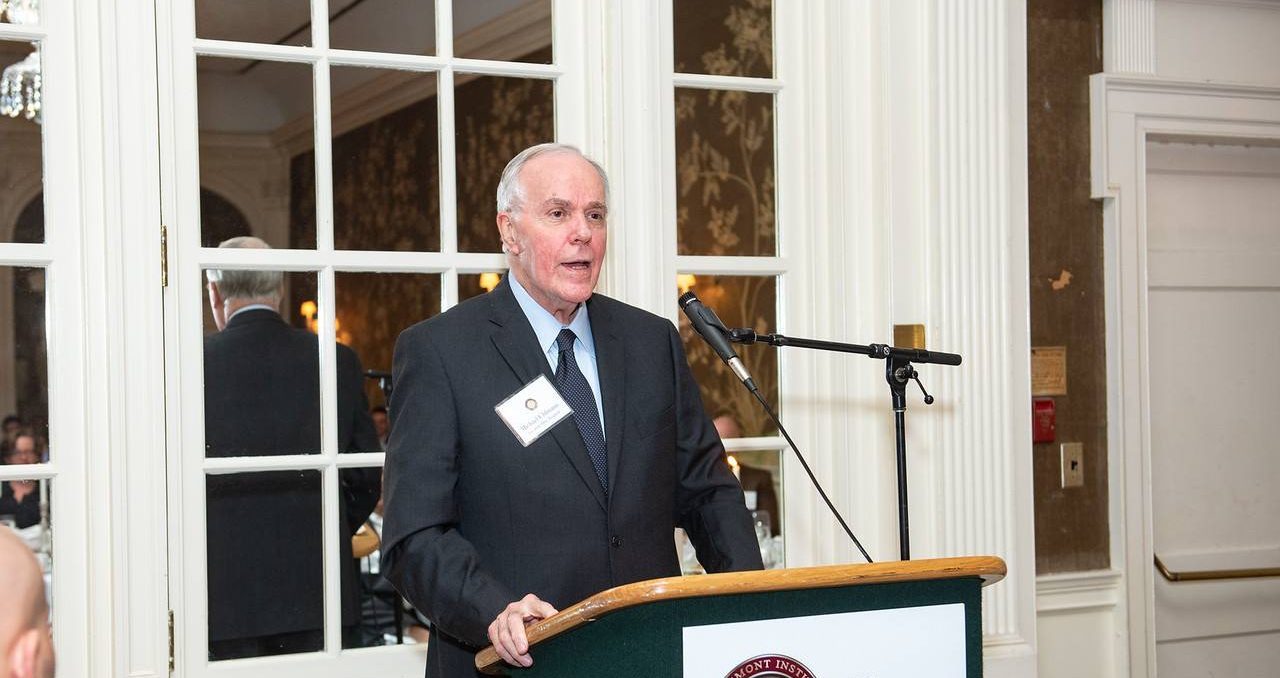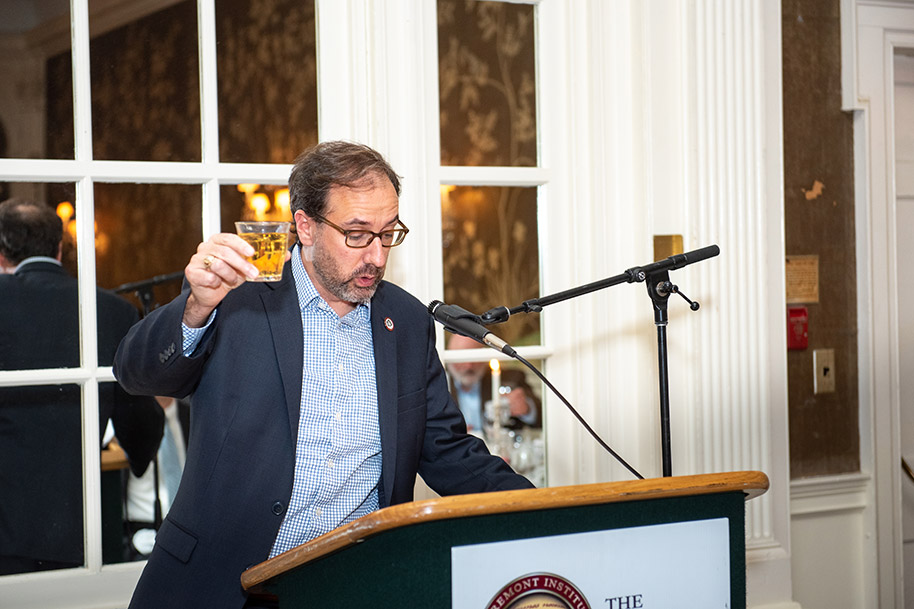Remarks accepting the Claremont Institute’s Henry Salvatori Prize for helping to secure the teachings of the American founding. Washington, D.C., October 27, 2018
In Honor of Michael M. Uhlmann

Introductory remarks honoring Michael M. Uhlmann, the Claremont Institute’s Henry Salvatori Prize recipient, for helping to secure the teachings of the American founding. Washington, D.C., October 27, 2018
To many of you here tonight, former students of his—whether in graduate school or Claremont’s fellowship programs—Michael Uhlmann needs little introduction. We know him as a beloved teacher, friend, confidant, and sometimes coconspirator—and as Uhlmann always likes to add to that last label—“currently unindicted.”
But I do want to spend some time sketching his extraordinary career in service to America and Americanism.
An undergraduate history major at Yale, Michael Uhlmann then received an LLB from the University of Virginia—one of the last years that they conferred that older degree, before the more Germanified Juris Doctor came into fashion—a fact from which Uhlmann derives great pride. And then, after an encounter with Harry Jaffa—appropriately, given the spirit of today’s gathering—he was persuaded to pursue graduate studies in government at the Claremont Graduate School, where he would receive a Ph.D. after studying with the likes of Jaffa and Leo Strauss.
Michael Uhlmann’s dissertation, in defense of the Electoral College, would be published in 1978. But his early work on that subject became a highly praised Minority Report of the Senate Committee on the Judiciary in 1970. After the House voted overwhelmingly to establish direct election of the president, many Senators were poised to follow suit. The Minority Report was widely credited with helping Senators to scuttle what would have been a constitutional travesty.
Following his work for the Judiciary Committee defending the Electoral College, Uhlmann became Counsel to Senator James F. Buckley of New York. In 1974, after serving as Assistant General Counsel at the Federal Trade Commission, President Gerald Ford, following Senate confirmation, appointed Uhlmann as Assistant Attorney General for Legislative Affairs at the Department of Justice. From 1981-84, he served as Special Assistant to President Reagan and Associate Director of the White House Office of Policy Development. He also held senior positions during the Carter-Reagan and Reagan-Bush presidential transitions. Regarding the latter, in 1988-89, as Clarence Thomas recounts in his autobiography, we have Uhlmann to thank for persuading him to become a judge.
After many years in private law practice in Washington, Uhlmann worked in conservative philanthropy as a Senior Vice-President at the Lynde and Harry Bradley Foundation in Milwaukee.
Quite a career—and as I’m sure he’ll confirm in a minute if I don’t—it’s still going. He is Clinical Professor of Politics and Government at the Claremont Graduate University and a Senior Fellow of the Claremont Institute. He is also one of the finest writers and analysts to grace the pages of the Claremont Review of Books.
But many of us in this room, his students of the last 10-15 years, remember him most warmly for his skill as a teacher, his good humor, and the patient and wise role he has played in advising countless careers in law, policy, journalism, and political leadership.
As a teacher, he is that rarest of specimens: a scholar of political things who’s actually gotten his hands dirty in the legal and policy world at multiple levels of government, and so might actually know some stuff.
This hard-nosed experience has led to a few very practical Uhlmannisms. Or, as they’re affectionately known, Uhlmann’s Laws—offered in class, or over bourbon, as wise and prudent distillations from long study and experience.
Like Uhlmann’s law of legislative analysis:
If an Act of Congress has a long title—lock up the children and run for cover.
Or Uhlmann’s Razor:
When stupidity seems a sufficient explanation, there is no need for recourse to any more elaborate analysis.
Uhlmann’s Razor also has a corollary known as Uhlmann’s First Law of Historical Causation:
It seemed like a good idea at the time.
And my personal favorite:
When evaluating the soundness of any moral proposition, law, rule, or regulation, however popular, to ascertain its true meaning, read it aloud slowly in a German accent.
Finally, I should mention the quiet work he has done over the years, born of deep conviction, to defend the ethic of human life against post-modernism’s intellectual hubris and callousness, whether through building and advancing the pro-life legal movement or bringing us work like his edited volume, Last Rights: Assisted Suicide and Euthanasia Debated.
Michael Uhlmann’s career has been devoted to God, country, friends, students, truth, and beauty. Henry Salvatori endowed this prize to honor men and women who advanced and defended the study of the American Founding and her principles.
I can think of no more fitting a recipient than our friend and teacher, Michael M. Uhlmann.
The American Mind presents a range of perspectives. Views are writers’ own and do not necessarily represent those of The Claremont Institute.
The American Mind is a publication of the Claremont Institute, a non-profit 501(c)(3) organization, dedicated to restoring the principles of the American Founding to their rightful, preeminent authority in our national life. Interested in supporting our work? Gifts to the Claremont Institute are tax-deductible.
Requiescat in pace Roger L. Beckett: January 6, 1974 – September 14, 2018
Michael Uhlmann accepts the Henry Salvatori award after a half-day Master Class on the scholarship of Harry Jaffa.



